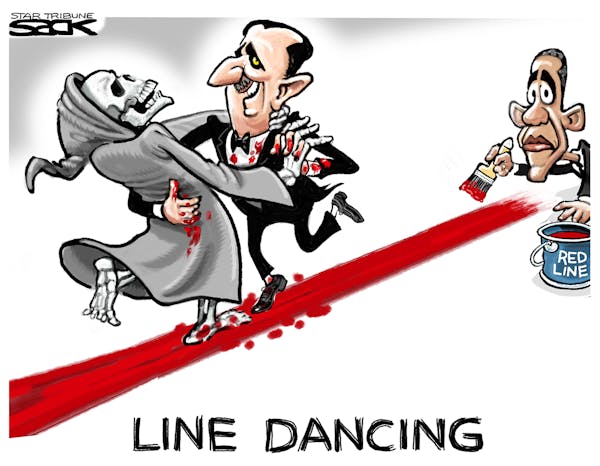President Obama is right to require conclusive evidence to determine if the Syrian government crossed a chemical weapons "red line." The faulty decisions derived from faulty intelligence in Iraq are testament to the need to get it right.
But Obama need not wait for further evidence to determine the lines Syrian President Bashar Assad will cross in order to defeat the insurgency. Ample evidence from the U.S. government and respected international organizations details the depravity of the Syrian regime.
At minimum, the United Nations estimates that more than 70,000 men, women and children have been killed. Unofficial estimates are much higher. While in no way minimizing the evils of chemical weapons, Ambassador Frederic C. Hof, a senior fellow at the Atlantic Council who was previously Obama's special adviser for the transition in Syria, put Assad's homicide into proper context in an interview with an editorial writer.
"There is no doubt that the worst thing happening to Syria today has nothing to do with chemical weapons," Hof said. "It has to do with the systematic shelling of residential areas and the terrorizing of their inhabitants by the regime using mortars, artillery, aircraft and scud missiles. … It's running up the body count and is driving people into refugee status."
For multiple reasons, Obama must act. First, if the president's red-line response doesn't match his rhetoric, it may embolden Assad and possibly other rogue regimes such as Iran and North Korea. In addition, Syria's civil war isn't only a massive humanitarian disaster within the country — it's creating a destabilizing refugee crisis in an already volatile Mideast.
And inaction by the international community has meant that the vacuum increasingly has been filled by Islamic extremist groups that could pose an eventual existential threat to other nations, including the United States.
Calls for the United States to intervene by imposing a no-fly zone, or by bombing chemical-weapons sites, are understandable. But it would be naive to assume that such direct military action could be so surgical that there wouldn't be a high risk of being dragged directly into the war.
The United States is simultaneously refining its exit strategy from Afghanistan, witnessing increasing disintegration in Iraq and trying to avoid war with Iran as it seeks a diplomatic route to address that nation's nuclear-weapons capability.
Americans are war-weary and war-wary, as evidenced by recent public opinion polls. It would be ill-advised to enter a war without sustainable levels of political and citizen support. Instead of direct military involvement, Obama, in concert with a broad-based global coalition, should go beyond the nonlethal assistance the administration has already provided and directly arm more-moderate Syrian rebels. This same coalition should help build effective, secular governing institutions.
It will not be an easy task. Moderates are harder to identify in an increasingly radicalized, sectarian Syria. Indeed, the U.S. government designated Jabhat al-Nusra, one of the more effective fighting forces in the country, as a terrorist organization after it pledged allegiance to Al-Qaida.
More-moderate factions do exist, however, and already have received nonlethal aid from the West. One of them, the Supreme Military Council led by Gen. Salim Idriss, is a candidate to receive military aid.
Arming more-moderate rebels has risks, including the weapons falling into the wrong hands. But inaction is increasingly risky, too. And if it changes the trajectory of the battle, it may also change the calculus of key players.
For instance, it could increase the chances that Assad realizes this is an unwinnable fight, which may bring him to the negotiating table — a negotiated settlement, after all, should still be the eventual goal. It may make Russia and China, which have shamefully enabled Assad's mass murder in order to protect their own selfish political and mercantile interests, to be more amenable to concerted U.N. Security Council action. And it may make more-moderate factions a more-appealing alternative to Syrians than the radicalized forces are.
Global inaction let Assad literally get away with murder, and it allowed Syrian dissent to devolve from a secular protest movement into an increasingly sectarian radicalized movement. Enough lines have been crossed: It's time for a more aggressive response.
----------------
An editorial of the Star Tribune (Minneapolis). Follow the editorial board: on Twitter | on Facebook | on Instagram | on Google+
Readers Write: Caucus system, state Sen. Nicole Mitchell, voting for RFK Jr.
Turn off cellphones in state's classrooms
How many hostages are still alive? Hamas doesn't seem to know


